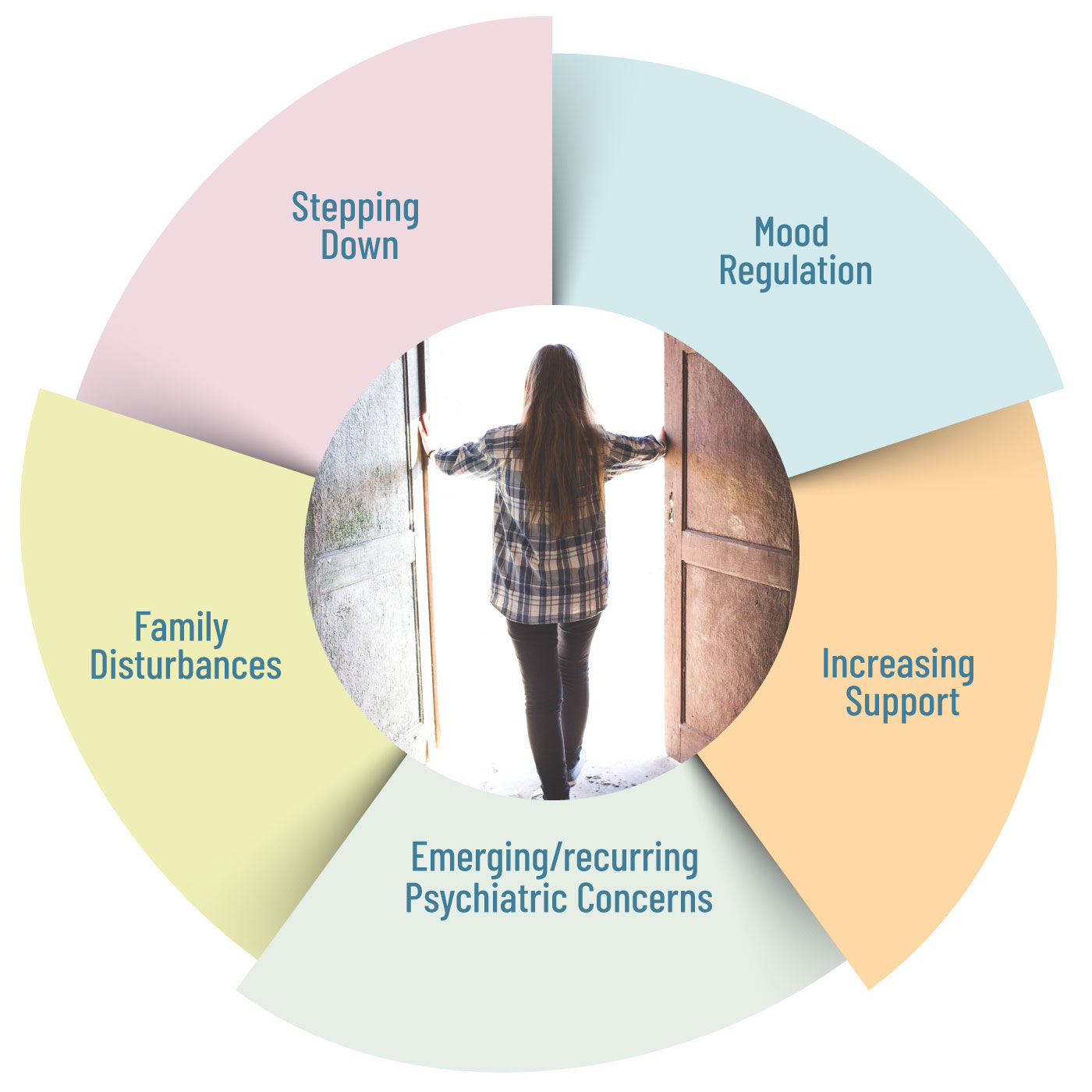Populations Served
People In Transition » all ages
There are many transitions in life, some are as simple as transitioning from high school to college or from job to job or town to town. Other transitions are more profound such as transitioning from a residential program or wilderness program back into their home environment or living through a divorce in the family or experiencing the death of a loved one. For many, these transitions take a serious toll, affecting one’s ability to function normally. At The Shoreline Therapy Center, we work with individuals, families, healthcare providers and other key individuals impacting our clients’ lives to help them successfully bridge these critical transitions.
Population Served: for People In Transition, all ages

Mood Regulation
Bipolar, manic/hypomanic, major depressive episodes; escalated symptoms, decompensation, compromised functionality.
Stepping Down
Clients recently discharged from partial/inpatient hospitalizations, wilderness programs, residential treatment centers, therapeutic boarding schools.
Emerging/recurring Psychiatric Concerns
Examining symptoms, formulating diagnosis, adjusting/evolving diagnosis; preventative care.
-
Mood Regulation
Bipolar, manic/hypomanic, major depressive episodes; escalated symptoms, decompensation, compromised functionality.
-
Stepping Down
Clients recently discharged from partial/inpatient hospitalizations, wilderness programs, residential treatment centers, therapeutic boarding schools.
-
Emerging/recurring Psychiatric Concerns
Examining symptoms, formulating diagnosis, adjusting/evolving diagnosis; preventative care.
-
Increasing Support
Changing schools, programs, providers; moving homes, locations; life transitions.
-
Family Disturbances
Traumatic events—divorce, death, exposure to hardship.

Stepping Down
Clients recently discharged from partial/inpatient hospitalizations, wilderness programs, residential treatment centers, therapeutic boarding schools.
Mood Regulation
Dependent on others for housing and financial support; struggles to manage daily personal responsibilities and employment.
Increasing Support
Depression, anxiety, bi-polar disorder, disorders related to other health conditions.
Emerging/recurring Psychiatric Concerns
Examining symptoms, formulating diagnosis, adjusting/evolving diagnosis; preventative care.
Family Disturbances
Traumatic events—divorce, death, exposure to hardship.
We all go through transitions in life. Some we master easily. Others take more effort and, at times, cause us to struggle. In these situations, other conditions can emerge such as depression or other underlying psychiatric conditions or merely an inability to adapt. We have much experience treating these conditions and situations through individual therapy, family therapy and/or our Connections program.
| TOPIC | ISSUE | SOLUTION |
| Stepping Down | A person recently discharged from a residential, wilderness or other similar programs. | The Connections program provides an ideal platform for them to “re-enter” their “real world” given its ability to treat clients throughout their everyday lives. |
| Mood Regulation | Inability to fully participate in life due to depression, anxiety, bipolar disorder as well as other disorders. | Our experienced therapists can treat these conditions through individual and family therapy or in conjunction with our Connections program. |
| Major Changes | As a person transitions from school-to-school, or school-to-college or town-to-town or other life transitions, they sometimes have trouble adapting to their new environment. | While there are several ways to treat these situations, the Connections program is particularly appropriate as we can help the client work on the skills necessary to adapt. |
| Emerging/Recurring Psychiatric Conditions | As a person undergoes a major transition in life, many underlying psychiatric conditions can rise to the surface. | Our therapists are adept at treating a wide spectrum of psychiatric disorders either through individual therapy or in conjunction with the Connections program. |
| Family Disturbances | Drastic changes or disruptions to the nuclear family such as divorce, death, or a sudden financial decline can lead to problems adapting to the new normal. | Either individual therapy or participation in the Connections program can help a client adapt to their new situation. |
Client Stories
Our Connections Program has a definite structure, but this structure gives us the freedom to creatively address a variety of clients with a variety of issues. As you can see in the client stories below, we treat each client as a unique individual and the programs we design to address their issues are customized to meet their individual needs. Click on one of the links below to see actual programs and schedules for different types of individuals:
-

Kelsey, 6-Year-Old with Behavioral Issues »
-

Erik, a 10-Year-Old on the Spectrum »
-

Scott, 15-Year-Old Transitioning Back After Wilderness Program »
-

Christie, a 17-Year-Old Boarding School Student Demonstrating Self-Harming Behavior »
-

Angela, an 18-Year-Old College Student Suffering from ADHD »
-

Paige, a 19-Year-Old Struggling to Find Direction »
-

Derek, 25-Year-Old Failing to Launch »
-

Mike, a 35-Year-Old with Autism »
Exclusions, Limitations and Caveats
Since we are not a residential facility, there are certain situations or cases we cannot take. However, if you are uncertain about whether we can help address your situation, do not hesitate to call us. If your situation is one we cannot treat, we would be happy to direct you to a therapist or program that can. The following are situations we cannot treat:
- Actively Aggressive Individuals: Displaying a propensity to cause harm or violence towards self, others or property.
- Active Substance Abuse/Addiction: While we work with many recreational users, we do not treat those with a serious dependence on any substance.
- Unsafe Home: We do not treat victims of abuse, violence or neglect.
- Medical Intervention: We cannot provide medical intervention or dispense prescription medication or treat wounds or injuries, nor provide ambulation or hospitalization.
